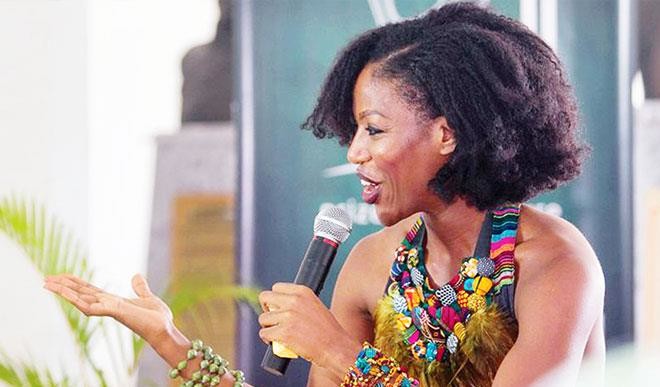
The Ake Arts and Book Festival has raisen to prominence in the last three years as one of the major literary festivals in Africa. Daily Trust on Sunday was at the 3rd edition.
Another year, another Ake Arts and Book Festival. This was the third year the festival held in the ancient city of Abeokuta South West Nigeria. And like it has done in the last two years, the festival showed signs of tremendous growth and remarkable improvements.
At a time when Nigeria has often been in the news for all the wrong reasons, Ake has played a significant role in changing the narrative, projecting a positive image and drawing crowds of foreign journalists, literature enthusiasts and guests coming to Nigeria for reasons other than terror or killings.
This year, festival director, Lola Shoneyin invited 82 guests; writers, performers, artists, photographers, film makers and thinkers for three days of what she called “cultural immersion”. And what an immersion it turned out to be. With an eclectic guest list drawn from all over the continent and all over the world, Lola and her Book Buzz team had prepared a cultural feast like no other, serving a rich buffet of thoughts and ideas.
What spurred Lola to create such a festival? Well, she wanted these intellectual engagements to happen on her continent, with her people as the audience. She said as much in a previous interview with the Daily Trust.
“My first book came out 18 years ago so I have been invited to countless international festivals at which I am one of two or three Africans. I enjoy the atmosphere at these events immensely but whenever I am critical about my continent, I wish I was talking to an African audience. In creating Ake Festival, my main goal is to create a safe space where African thinkers, poets, writers, artists and filmmakers come together to have honest conversations about issues around Africa and being African,” she had said.
This year, Ake drew the likes of Chris Abani, Helon Habila Nnedi Okarafor, all Nigerian writers in the diaspora, as well as others from Egypt, Benin Republic, South Africa, Uganda as well as other international acclaimed authors and film makers. Unlike in the previous years where Wole Soyinka, in whose backyard the festival holds, was the festival headliner, this year, Ake had Professor Niyi Osundare as the main attraction.
He charmed the audience and oozed wisdom and sagacity, enthralled the crowd with his harrowing experience during Hurricane Katrina and his evolution as a poet and dramatist. It was a scintillating occasion, one that many people would remember for a long time.
It is to the festival’s credit that it has continued to draw not only the literati but the politicians as well. Last year, Rotimi Ameachi, then governor of Rivers State, was on a panel. Former President Olusegun Obasanjo, who has written several books, was on hand to discuss politics, history and his tiff with Wole Soyinka. And of course Soyinka had his chance to respond and throw more lights.
This year, Nasiru El-Rufai, the governor of Kaduna State and author of ‘Accidental Public Servant’ was the one who sat in a panel to discuss oil and politics along side Prof. Howard French.
One thing he said that the audience could sympathise with was how politics and governance has deprived him of the opportunity to read.
“I haven’t read a book in a while,” he said. “I used to read a book every week but now all I read are files. One thing that being a governor has deprived me of is the time to read books.”
However when he said that climate change was not his major concern, he left more than a few jaws hanging.
“I am 55; I don’t worry about climate change because I would be dead before it happens. I don’t worry about my children because technology will take care of it,” the governor said
But one governor who was worried about his children was Sen. Ibikunle Amosun of Ogun State. For him, a festival such as Ake is something his generation owes to the future.
“We can’t let a festival like this die, because this is something we can leave behind for our children,” he had said at the opening of the festival.
Governor Amosun has been an avid supporter of the festival as his state has been one of the biggest partners of Ake since its inception. Every year, he has been present to declare the festival open. This year, it was even more dramatic as he flung open the double door of the June 12 cultural Centre conference hall and let in a stream of sunlight to the applause of the audience.
With what has happened to other major literature festivals in Nigeria, the governor’s words strike a nerve. Last year, The Port Harcourt Book Festival climaxed as the UNESCO World Book Capital. This year it didn’t hold principally because Rotimi Ameachi, who has been heavily supporting the festival, is no longer the governor of Rivers State.
Similarly, the Mu’azu Babangida Aliyu Literary Colloquium that has drawn keynote speakers like Wole Soyinka, Odia Ofeimun and Pius Adesanmi to Minna has folded up because the former governor of Niger State has left office.
But Lola Shoneyin has been running Ake on a different model. She has succeeded in making the festival attractive enough to draw sponsorship from the private sector. This year, three more sponsors were unveiled and they rolled in big.
One of the sponsors, Marine Platform announced a grand programme to not only support the festival but to promote literacy in Nigeria’s north. The plan, as unveiled by Baji Nyam, the company’s Chief Financial Officer at the opening ceremony, included donations of mini libraries to schools in the region as well as supporting writers from that region.
To make good this promise, the company lavished a million naira on five writers from the north who have had books published in 2015.
Joining Marine Platform as new sponsors of the festival were Chevron/NNPC and the European Union Commission.
It wasn’t all about books though. The festival had enough film shows to stimulate, titillate and provoke. How else would one have endured watching the Senegalese film, ‘Ramata’, which had many in the audience wondering what had just happened? It provoked debates about love, rape and fidelity.
And the documentary ‘The Man Who Mend Women’ directed by Thiery Michel, about DR Congo’s doctor Mukwege, who cares for women damaged by rape and the conflict in that rich but unfortunate African country drew tears, anger and applause for the hero director.
Perhaps the stand out performance was the festival play, ‘Hear Word: Naija Woman Talk True’ featuring veteran stage names like Joke Silva, Taiwo Ajayi-Lycett, Bimbo Akintola, Omonor, Elmina Ibru and other scintillating performers.
What started off as a chronicle of woes by women, humourous, harrowing and depressing, soon spirals into a story of defiance and hope, of strong women who rise up and say no to the exploitations of oppressive men, thieving relatives, who want to take a widow’s property, and those who want to shackle and bind.
After thunderously applauding every scene change, the audience rose as one to give the play a rousing standing ovation. A powerful statement from the actors and the discerning crowd that appreciated their efforts.
As in previous years, the festival featured book chat that gave readers opportunities to hear authors speak about their books lively panel discussions on varied issues from literature, religion and civil strife and thoughts and ideas that shape the reality of Africa and its perception both by Africans and non-Africans.
One of the busiest places at the June 12 Cultural Centre venue of the festival was the book stands. One Nigerian tweeted how he had never before seen Nigerians queuing up and jostling to buy books as they did at the festival.
But it wasn’t only Nigerians who lined up at the stands. Guests and visitors who had arrived from other countries joined in the frenzy as well. Such unfettered access to books from Nigeria and other countries is not an opportunity they get every often.
But the importance of the festival in shaping thoughts and perceptions cannot be overemphasised. It has become the heart of the literary fever that has gripped Nigeria and Africa.
Kinna Likimani, Ghanaian blogger, while making a comment during one of the panels said, “The only Nigerian product I can get in Ghana is a book.”
It is because of statements like this that the Ake Arts and Book Festival should always matter. And Lola Shoneyin has continued to steer this Armada into previously unchartered seas, breaking ice and new grounds and tooting a fog horn, whose reverberations have continued to echoed in faraway lands.

 Join Daily Trust WhatsApp Community For Quick Access To News and Happenings Around You.
Join Daily Trust WhatsApp Community For Quick Access To News and Happenings Around You.


